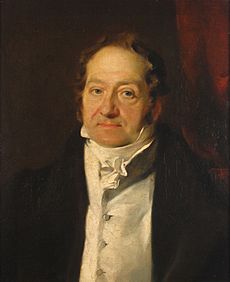Sir Alexander Boswell, 1st Baronet facts for kids
Quick facts for kids
Alexander Boswell
Bt FRSE FSA
|
|
|---|---|
| Born | 9 October 1775 Auchinleck House, East Ayrshire, Scotland
|
| Died | 27 March 1822 (aged 46) Auchtertool, Fife, Scotland
|
| Nationality | Scottish |
| Occupation | Poet, antiquary, songwriter |
|
Notable work
|
Jenny's Bawbee; Jenny dang the Weaver |
| Parent(s) | James Boswell Margaret Montgomerie |
| Relatives | James Boswell the Younger (brother) |
Sir Alexander Boswell, who was also the 1st Baronet, was a Scottish poet, a person who studies old things (an antiquary), and a songwriter. He was born on October 9, 1775, and passed away on March 27, 1822.
Alexander was the son of James Boswell, who was famous for writing about his friend Samuel Johnson. Alexander used money he inherited to get a spot in the British Parliament. He also successfully asked for a special title called a baronetcy because he supported the government.
Later, his money problems grew, and he was found to be the writer of strong attacks against a rival. Sadly, he died from injuries he received in a duel.
Contents
Early Life and Education
Alexander Boswell was the oldest son of James Boswell and Margaret Montgomerie. He was born at Auchinleck House in Scotland.
He went to school in London at Soho Academy in 1786. Then, he attended Eton College from 1789 to 1792. His father wanted him to become a lawyer, so Alexander went to the University of Edinburgh in 1793.
After his father passed away, he studied law at the University of Leipzig in Germany. However, he soon left the course. He then traveled to Dresden and Berlin before coming back to London in 1796.
Alexander was a tall and strong person. He managed his inherited land very well. By 1801, he was earning more money from his land than his father had. He also loved farming and country sports.
Poetry and Military Role
Instead of becoming a lawyer, Alexander became very interested in old Scottish writers. He became a poet and a collector of rare books. He also became good friends with the famous writer Walter Scott.
In 1815, Alexander started his own small printing press at Auchinleck. Here, he printed poems written by himself and his friends. He wrote several popular Scottish songs. The most well-known ones are Jenny's Bawbee and Jenny dang the Weaver.
Besides his writing, Alexander was also involved in the military. He was a captain in the Ayr yeomanry (a type of local volunteer cavalry) starting in 1803. He was promoted to Major in 1815 and became the Lieutenant-Colonel Commandant in 1816.
Life in Parliament
In 1816, Alexander Boswell bought his way into the House of Commons. This is a part of the British Parliament where laws are made. He paid a person named Paul Treby, who controlled a seat in the area of Plympton Erle.
In politics, Alexander was a strong supporter of the Tory party. This meant he usually voted with the government of the day. However, he became unhappy with the government ministers, especially Prime Minister Lord Liverpool.
He felt that Lord Liverpool had not helped him enough to get his seat in Parliament. He wrote that he had supported the government "more faithfully than any paid person in office."
Fighting Against Unrest
After the Peterloo Massacre, the government introduced new laws called the "Six Acts" to stop public unrest. Alexander spoke about these laws, even though he wanted to be in Ayrshire to help stop unrest with his yeomanry.
In 1819, he also spoke against changes to how Scottish local governments were run. In 1820, he was very active with his yeomanry in stopping public protests. He also attended a meeting in Ayrshire to show loyalty to King George IV during the Queen Caroline affair in December 1820.
Leaving Parliament
Alexander had asked the government for a special title, a baronetcy, because of his support. He became angry when Lord Liverpool's refusal to give him the title was made public. In November 1820, he almost resigned from Parliament. However, he was told that Lord Liverpool might change his mind.
Then, Alexander faced serious money problems. He had made some bad decisions buying land, and his rental income dropped because of a poor economy. He also had to pay for his yeomanry. It cost him a lot of money to be in Parliament.
He decided he could not afford it anymore and resigned in February 1821. This was the day after he voted to support the government on the Queen Caroline issue. It was ironic that he received the baronetcy he had wanted that summer, in recognition of his loyalty.
His Death
After leaving Parliament, Alexander Boswell wrote many strong, anonymous attacks. These were published in two Scottish newspapers, the Beacon and the Sentinel. He attacked a well-known politician named James Stuart of Dunearn, calling him a bully and a coward.
When a legal dispute happened between the owners of the Sentinel, Stuart found documents that suggested Alexander was the author of these attacks. Stuart demanded that Alexander either deny writing them or apologize. Alexander refused to do either. Because of this, Stuart challenged him to a duel.
The duel took place on March 26, 1822, in Auchtertool, near Kirkcaldy in Fife. Alexander deliberately shot his gun away from Stuart. However, Stuart, who had never used a gun before, shot Alexander in the collarbone.
Alexander was taken to Balmuto House, which was part of his family's estate. He died the next day.
Alexander left behind £10,000 in assets but had £72,000 in debts. Stuart was later found not guilty of murder at his trial. More than 11,000 people attended Alexander Boswell's funeral. The funeral procession was over a mile long.
 | Georgia Louise Harris Brown |
 | Julian Abele |
 | Norma Merrick Sklarek |
 | William Sidney Pittman |



